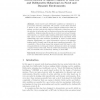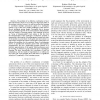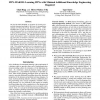1047 search results - page 6 / 210 » Learning the required number of agents for complex tasks |
ECAL
2007
Springer
14 years 1 months ago
2007
Springer
Both reactive and deliberative qualities are essential for a good action selection mechanism. We present a model that embodies a hybrid of two very different neural network archit...
ATAL
2009
Springer
14 years 2 months ago
2009
Springer
In this paper, we study multi-agent economic systems using a recent approach to economic modeling called Agent-based Computational Economics (ACE): the application of the Complex ...
ATAL
2000
Springer
13 years 12 months ago
2000
Springer
In agent systems, different (autonomous) agents collaborate to execute complex tasks. Each agent provides a set of useful capabilities, and the agent system combines these capabili...
ICRA
2007
IEEE
14 years 1 months ago
2007
IEEE
Abstract— The problem of an effective coordination of multiple autonomous robots is one of the most important tasks of the modern robotics. In turn, it is well known that the lea...
AAAI
2008
13 years 10 months ago
2008
We describe HTN-MAKER, an algorithm for learning hierarchical planning knowledge in the form of decomposition methods for Hierarchical Task Networks (HTNs). HTNMAKER takes as inpu...



